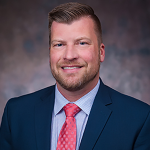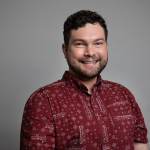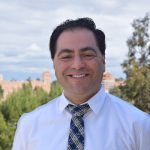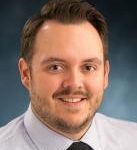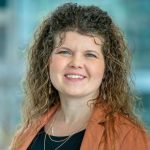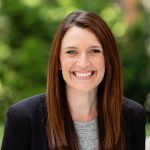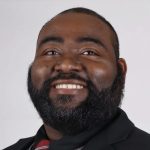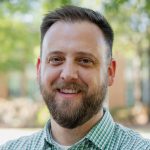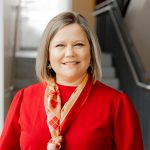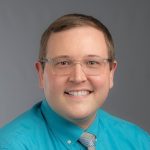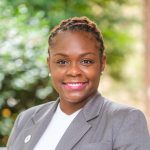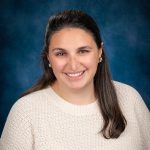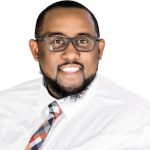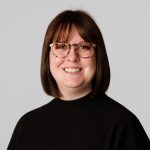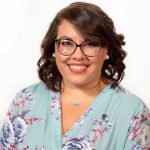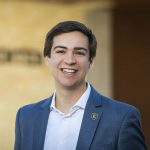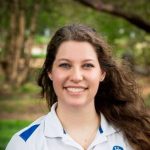Ballots were sent to all active members on Monday, November 27. Please check the email listed on your NODA profile for instructions. If you need assistance, please contact NODA at noda@umn.edu.
Candidates for President-Elect
Candidates for General Board Member
Candidates for Regional Coordinator
Candidate Materials (By Last Name)
Jeff Brown
Interim Assistant Vice President for Student Affairs
American University (Region VIII)
- Introduction Video
- Why are you applying for an elected position and what skills/experience will you bring to this role?
I have considered NODA my professional home for over ten years. Over these years, NODA has provided me with exceptional learning, networking, and professional and personal development opportunities. This fact has remained true as I have evolved over the years in different roles, functions, and institutions. This year, I decided to apply to be President-Elect to give back to this extraordinary association that has given me so much. My wish and desire are to take my involvement to another level to lead this Association and the field of orientation, retention, and transition into the future.
NODA has provided me with multiple ways to engage, network and be involved. Within a year of becoming a member of NODA, I jumped right into leadership opportunities serving as the chair for educational sessions and evaluation. This gave me an immediate connection to the work and people of NODA. It also highlighted for me what NODA members need and want in terms of their own professional development and networking. In 2012, I joined the NODA Board of Directors as the board was in the final stages of adopting new governance model. This opportunity gave me the skills surrounding association leadership, governance, and the operations of a complex not-for-profit organization. Following my board tenure, I applied to serve as an OPI faculty member. This position enabled me to work with the development and delivery of an institute designed to serve our profession’s newest members. In the role of faculty member and then most recently Lead Faculty, I have had the pleasure and privilege to support, guide, and mentor so many new professionals that have been eager to learn and connect with each other, serve our students and further their own growth and development.
In summary, I believe strongly in providing new students, their families, and caretakers the knowledge, skills, and resources to be successful in higher education. NODA and its members play a critical role in making this lofty goal happen. I hope to be able to lead the premier association that serves orientation, transition, and retention professionals in their work. - Please describe what your commitment to diversity, equity and inclusion means to you. Provide examples of how you have embodied and/or implemented DEI Initiatives, practices and/or strategies ?
A commitment to diversity, equity and inclusion must go beyond words on a screen or a piece of paper. A commitment needs to be deep and woven throughout everything one does on a regular, consistent basis. It involves deep engagement, dialogue, self-reflection, and vulnerability. In terms of an organization, this commitment needs to include an assessment of its membership, practices, policies, and other guiding documents. Organizations should have a solid understanding of the voices at the table, and those that are not. Going beyond, organizations must strive to include all voices. From an equity lens, organizations need to identify what populations don’t have similar access to and identify ways to be more equitable to assure ALL people are represented. This cannot and should not be a one-time exercise, yet a continual process that reviews, assesses and strives for continual improvement.
In my current role as Interim Assistant Vice President, I am often confronted with situations that require me to look at my role with diversity, equity and inclusion. One of the largest DEI initiatives I have led at my current institution was a comprehensive review on how the University responds to bias or bias-related situations. This involved a multiple month review to include University stakeholders where current practices, policies, and resources were critically assessed. The working group presented recommendations that led to multiple changes including the establishment of restorative practices, a new equity and title IX office and identifying multiple other ways to address harm on our campus.
In addition, and directly related to my work with NODA, I have led the OPI faculty over the last several years to assure that this topic is being addressed during OPI. We have worked to make sure our learning outcomes are clear, and that DEI is not just a session of the Institute, but woven throughout all sessions and practices of the Institute. - Résumé
- Past NODA Position
Committee Member – Research Committee
General Board Member
Orientation Professionals Institute Faculty
Orientation Professionals Institute Lead Faculty - Non-NODA Leadership Positions
South Carolina College Personnel Association (SCCPA)
President, 2011-2012
President-Elect, 2010
Past-President, 2008-2009
President – 2007-2008
President-Elect – 2006-2007
Secretary – 2003-2005
Publications – 2002-2003
Spring Conference Co-Chair – 2002
ACPA – College Student Educators International
Convention Sponsored/Co-sponsored Programs Chair, 2015
Convention Exhibits Team, 2011
Convention Ancillary Program Chair, 2010
Convention Registration Chair, 2006
Commission for Housing and Residential Life Directorate – 2009-2012
Webmaster – 2009-2011
AID Upstate Board of Directors, Greenville, SC
Past-President, 2014-2015
President 2013-2014
Secretary 2011-2013
Southern Association of College Student Affairs (SACSA)
Local Arrangements Chair, 2015
South Carolina Housing Officers Association (SCHOA)
Vice President 2003-2005 and 2006-2009
Southeastern Association of Housing Officers (SEAHO)
State Representative 2003-2005 and 2006-2009
Membership Services Committee 2002-2003
[Back to President-Elect Candidates]
Shannon Calega
Director of Orientation and Family Engagement
University of Tampa (Region VI)
- Introduction Video
- Why are you applying for an elected position and what skills/experience will you bring to this role?
At the NODA Annual Conference, it is a frequent sentiment among attendees that this association has evolved into a cherished community for its members. It is not uncommon to encounter seasoned professionals who initially embarked on their careers in the orientation field and have since ascended to prominent leadership positions within their respective institutions, yet they steadfastly return to the conference year after year, all drawn by the sense of belonging that NODA imparts.
My inaugural encounter with NODA transpired in 2008 when I arrived in Boston to participate in the Orientation Professionals Institute (OPI). As a fledgling professional, I was new to the world of student orientation. Little did I realize at the time that OPI and my inaugural NODA conference would serve as catalysts, revealing my true calling within the realm of Student Affairs. Fifteen years later, NODA has unequivocally become my professional sanctuary, nurturing my fervor for the orientation, transition, and retention field.
Throughout the years, I have been honored to undertake various leadership roles within NODA. These roles include serving as the Region VI Coordinator, Network Co-Chair for the Non-Traditional Network, and developing the core competency curriculum for the Leadership and Organization competency. While these leadership positions have enriched my tenure in NODA, my most cherished leadership experience has been my tenure as a General NODA Board Member. The privilege of sitting at the table with NODA colleagues who share the same unwavering commitment and reverence for the association as I do enabled me to advocate for the identification, deliberation, and formulation of policies aimed at enhancing the educational experience for all our members.
Although my term on the Board of Directors concluded three years ago, the work that lies ahead remains perpetual, both for the association and the Student Affairs field, but most crucially, for the members of NODA. Assuming the position of President-Elect offers me the opportunity to perpetuate my dedication to enact substantive, meaningful change. This change will continue to kindle the flames of enthusiasm for emerging professionals and rekindle the same passion for those in mid and senior-level positions. - Please describe what your commitment to diversity, equity and inclusion means to you. Provide examples of how you have embodied and/or implemented DEI Initiatives, practices and/or strategies ?
My commitment to diversity, equity, and inclusion is grounded in my belief that all individuals have the right to succeed socially, educationally, and professionally. For this to occur, the work done to provide this is never-ending, consistently addressing the impact of injustice and overcoming barriers by developing conditions of equity.
Personally and professionally, I have embodied my dedication to diversity, equity, and inclusion by intentionally building my understanding through a variety of educational outlets. This includes professional development conversations, attending seminars and trainings, and most importantly creating a safe and supportive space for diversity, equity, and inclusion conversations to occur. I take these experiences and varieties to find and implement ways for all individuals to have the opportunity to excel socially, educationally, and professionally. This includes finding leadership opportunities within my campus to continue to build a community that values diversity, equity, and inclusion. This includes serving on the Bias Education Resource Team, Spartan Support Committee (focused on identifying and assisting students of concern), and the Accessibility Committee.
Within my team, I have worked diligently with my staff to ensure that the work we are doing keeps diversity, equity, and inclusion at the forefront of strategic planning, programmatic planning and implementation, and collaborative professional relationships. Over the summer of 2023, utilizing the results of the CAS external review, I led my team to develop the first mission statement, vision statement, and learning outcomes for the office. The importance of helping students find a sense of belonging through the offering of diverse and inclusive educational experiences served as the framework from which these documents were created. The result includes DEI training for all of our student leaders, specific presentations on the importance of personal pronouns, including providing student leaders with personal pronoun pins, developing and implementing a DEI section to the new student online orientation program, and partnering with DEI to host events during the Fall and Spring Week of Welcome programs. - Résumé
- Past NODA Position
General Board Member
Network Chair – Nontraditional Student Network
Regional Coordinator
Regional Conference Co-Host
Co-Creator of Core Competency Curriculum
[Back to President-Elect Candidates]
Devin Carpenter
Director of New Student Success
University of Montana (Region I)
- Introduction Video
- Why are you applying for an elected position and what skills/experience will you bring to this role?
I am a builder, a connector, and an activator, and I know these strengths will serve NODA in a variety of ways. What excites me about the opportunity to join the General Board are the ways NODA is currently growing and evolving to better meet the needs of the field of OTR, and empowering us as professionals to adapt.
Across my decade long career at the University of Montana (UM) I have faced significant leadership turnover, campus political obstacles, and administrative pressure to meet institutional retention goals. In 2019, I redesigned our onboarding programs for new students including building and implementing an experiential welcome week from the ground up. In order to achieve this, I connected with many areas of campus, and brought disparate priorities and opinions together to better support student success and retention. Since then, the program has persisted and evolved, and data shows student enrollment and first-time student retention have gone up every single year. I am incredibly proud of the pipeline for student success our campus has designed, and the dividends it’s paying for our students and our larger community.
In 2022, I was faced with the difficult reality that I must relieve my Student Ambassadors of their volunteer campus tour duties; a 50+ year tradition on UM’s campus. As a connector, I brought these student leaders, who were reasonably upset with the decision, into conversations to design their pathway forward together. We have successfully repositioned them as first-year mentors who can continue serving new students and our campus far past our orientation and welcome programs. These experiences remind me that challenges, when approached with an open mind and a “try stuff” attitude, can be successfully solved by bringing people together and leveraging each person’s individual skills.
My mindset of innovation and activating people towards a shared goal is one that will serve the General Board of NODA well during this time of reinvigorating our membership, establishing consistency between our core competencies and educational initiatives, embodying DEI work through actions instead of words, and serving our membership in new and innovative ways. - Please describe what your commitment to diversity, equity and inclusion means to you. Provide examples of how you have embodied and/or implemented DEI Initiatives, practices and/or strategies?
The work of equity and inclusion is inextricable from all I do. In college, I was quickly drawn to activism and civil disobedience, and this notion of disruption and questioning systems is a mentality I carry with me to every role. DEI means action, and in order to act we must continuously be attuned to students’ changing needs, the shifting political landscape, and its effects on the systems we can influence.
My bias to action is demonstrated by my contributions to crafting UM’s Diversity Strategic Plan. Our president outlined five Priorities for Action, within which the Diversity Advisory Council noticed many gaps. We created a parallel document noting areas for DEI initiatives, identifying “accountable owners” for each, and noting barriers to progress to ensure successful implementation.
Central to UM’s welcome week is our partnership with 40+ local organizations. I’ve made it a priority to build relationships with TRiO, All Nations Health Center, Lambda Alliance, and others to support unique student needs and identity groups. To me, this style of grassroots engagement is what instills values of DEI in students. It showcases the breadth of our community and engages our students in the process by teaching them how to continue “the work” on their own.
My first job as an undergraduate student was planning diversity programs. Recently, I was appointed and am honored to serve as the Interim Director of this same unit, years later. The work of social justice and advocacy was something I fell into head first as a young person, and is something I continue through overt acts, strategic realignment of programs and systems, and continued personal community engagement. Supporting the ever-changing needs of our most vulnerable and underserved populations, on our campuses and within our Association’s membership, are things I will always be deeply committed to, and will actively advocate for at any table I have the privilege to sit at. To embody the words of Shirley Chisholm, if there isn’t a seat for me to represent the voices who are absent, I have no problem bringing my own folding chair.
- Résumé
- Past NODA Positions
Committee Member – Regional Coordination Committee
Regional Coordinator, State/Province Coordinator
Committee Chair – Core Competency Committee
Committee Member – Core Competency Committee
[Back to General Board Candidates]
Christy Carral
Orientation Leader Development Coordinator
University of North Carolina at Chapel Hill (Region VI)
- Introduction Video
- Why are you applying for an elected position and what skills/experience will you bring to this role?
I’ve been involved with NODA on the regional level since I was an undergraduate student and have continued my involvement in various ways since attending my first SROW in 2014. Because of this, NODA has been a constant in my professional life. I owe so much to this organization for helping me to establish so many of the connections that have continued to make working in OTR so fulfilling for me. Throughout my career, I’ve been involved with NODA in various ways, more recently as a member of the Regional Leadership Team. Being a member of the team has allowed me to help create these engagement opportunities for others to establish the same connections within NODA that I have made. I think we were off to a strong start and I’d like to continue to build on the momentum that allowed members of the region to take up space and process through challenges, provide each other with potential solutions, and workshop ideas across various institutions and I hope to continue providing this space if elected as Regional Coordinator. I believe my experiences from having served on the Regional Leadership Team will allow me to come into the role with historical context and my attendance at our past 2 annual conferences, OPI last year, and SROW the past 3 years has given me additional context on the needs of the region and the association in general. In thinking of the skills I possess when working with others, I communicate effectively, follow up on said communication appropriately, and maintain transparency in my leadership. Additionally, I encourage others to get involved if they have that interest and assist in identifying ways where they can contribute. I am skilled at planning ahead, making information accessible, delegating, and seeking input from team members. I also enjoy having the opportunity to adapt my leadership and plans accordingly based on the needs of those I am collaborating with, which I think will be helpful in engaging both the region and the Regional Leadership Team members. - Please describe what your commitment to diversity, equity and inclusion means to you. Provide examples of how you have embodied and/or implemented DEI Initiatives, practices and/or strategies?
To me, this commitment means that I will make a series of promises to myself and others and that I’ll hold myself accountable for fulfilling them. I’m committed to learning more about DEI on my own and enjoy reading various forms of content both from reliable sources to learn from but also from various sources making the rounds on social media in order to get a sense of what different ideas may be outside of higher education or in the general public to have a pulse on what some of the feelings on a topic might be. With my students, I give them an overview and help them understand the importance of DEI and one of my most effective strategies with them has been helping them understand how this affects them in their day to day lives and how they can make a positive impact. Breaking things down into digestible, realistic examples has been beneficial because they’re able to understand how they can apply DEI and make an impact, rather than them feeling intimidated by the idea and feeling it is far removed and abstract. I’m passionate about making processes and experiences more accessible so that more than the intended audience is included. I’ve mostly researched students with disabilities and how to make orientation experiences more accessible for them and their family members and have presented on this topic at both the regional level and the national level. Ultimately, I view DEI from a lens of empowerment where I do what I can to demystify it to those who are hesitant to express a lack of understanding. There is so much that any of us can do, regardless of our role in order to create more accessible spaces that are inclusive of those who may look, talk, think, etc. like us and I think often times we don’t fully take advantage of all we can do because we don’t realize how much is up to us. My approach is to keep in mind how much is up to us and up to me.
- Résumé
- Past NODA Positions
Committee Member – Regional Coordination Committee - Non-NODA Leadership Positions
1. NASPA GAP (Graduate Assistant Program) Representative for Florida International University
2. NASPA Conference Intern
Other roles (volunteer, regional conference planning committee, and regional committee member) have all been through NODA.
[Back to General Board Candidates]
Jesse Carrasco
Associate Director
University of California-Los Angeles (Region II)
- Introduction Video
- Why are you applying for an elected position and what skills/experience will you bring to this role?
NODA has been my professional home for over 20 years. This was the first association I became a member of, and it’s still the association that I return to when I want to reconnect with friends and brainstorm new ideas. Sadly, due to the combination of statewide travel bans and policies on our campuses, as well as NODAC conferences being held in states we could not travel to, Region II has recently been forced to sit aside and not participate in the conferences. This led to disinterest in the Association and lack of representation of the West Coast in leadership positions. I want to change that. Region II has historically had a very strong presence within NODA leadership. I myself have held several roles in regional leadership (including State Coordinator and regional conference host), I have served as an NODAC Conference Host, and have previously completed a full term as a NODA Board Member. I would love to see the West Coast represented on the NODA Board once again, I want to try and bring some life back into our region, and I want to be a voice for all NODA members.
It’s an interesting and exciting time in the Association right now. Knowing that NODA will slowly be phasing out of the regional model and moving to a communities model, I want to be the voice at the table that is asking the questions to ensure that we are setting up our Association for success (i.e. Knowing that the regions were how new NODA members usually got connected with peers, will there be a way to onboard new members into communities? Will communities be beneficial for Canadian and other international institutions? In the rare event that someone isn’t able to find a single community to join, are there other options for these members?). I am excited to have an opportunity to sit around the table and help usher in this new era for NODA. - Please describe what your commitment to diversity, equity and inclusion means to you. Provide examples of how you have embodied and/or implemented DEI Initiatives, practices and/or strategies?
Living in California, and working at one of the most diverse universities in the country, I believe that diversity, equity, and inclusion is, and should be, the backbone of our program. Every decision that we make to shape our program each year affects a wide variety of students. Within the confines of “freshman” or “transfer” there runs a gamut of identities. Our program has seen 12 yr old transfer students, 50 yr old freshmen, parenting students, non-traditional students, formerly incarcerated students, international students, veteran students, and much more. Simply put, as our students arrive on our campuses with more intersecting identities I believe that we need to be intentional in our planning and provide a program that is welcoming, inclusive, and accessible to every student.
While there is no universal solution to ensure that every student’s needs are met, we must still try to find solutions that will meet students where they are to provide them with accessible and equitable opportunities. We have tried to do whatever we could to help students whenever possible. During COVID, when the world switched to online orientation sessions via Zoom we created a flipped time orientation session for our international students and one for the families. The international orientation sessions ran throughout the middle of the night (for us) so the session was held during traditional business hours for the international students/families. This year, I worked with two departments on campus to provide free child care to any parenting student that wanted to attend orientation but may not have been able to because of child care needs/costs. In both instances, we received positive feedback from the students that participated stating that they felt supported and were excited to start their academic careers. I believe that we must continue to find ways to make changes within our programs that will help students feel more welcomed and a part of the university community.
- Résumé
- Past NODA Positions
Annual Conference Chair
Committee Member – Annual Conference Advisory Committee
General Board Member
Regional Conference Chair
State/Province Coordinator
Committee Member – Scholarships & Awards Committee
[Back to General Board Candidates]
Joe Colangelo
Director
University of Michigan-Ann Arbor (Region VII)
- Introduction Video
- Why are you applying for an elected position and what skills/experience will you bring to this role?
For well over a decade, NODA has been my professional home. It is an organization that has been central to the development of my career, forged invaluable relationships with peers, and has directly contributed to my ability to serve students on my campus. I want to serve as a general board member so that I can further contribute to the organization, and position it to have as impactful a role on the experience of others as it has for me.
Presently, I serve as the Director of the Office of New Student Programs at the University of Michigan and plan to leverage my experience navigating a complex structural organization as an administrator in concert with my years of NODA involvement to benefit the association. I have served in numerous volunteer capacities within NODA, including several regional conference planning committees, the 2008 and 2018 annual conference planning committees, and for the last three years as a co-chair of the Large Institution Network. - Please describe what your commitment to diversity, equity and inclusion means to you. Provide examples of how you have embodied and/or implemented DEI Initiatives, practices and/or strategies?
Diversity, equity, and inclusion is a critical lens through which I view my work, and is a central tenet in my decision making and day to day engagement on my campus. This commitment means that it is imperative for me that I not only acknowledge my privileged identities and how they impact the way I navigate my community, but seek to deconstruct inequitable practices and structures to benefit all students and families that our office engages with. Some key examples of this can be seen in the equity based decision making that I have employed regarding the modality of our orientation program. I have worked over the last two years to design a program that removes barriers to course registration access through leveraging virtual advising appointments, created options and pathways for students and families to limit expenses and travel cost to attend our in person programs, centered topics of diversity, equity, and inclusion throughout every phase of our program, and worked to institute a substantial automatic fee waiver system to support low income students.
- Résumé
- Past NODA Positions
Committee Member – Annual Conference Advisory Committee
Network Chair – Large Institution Network
[Back to General Board Candidates]
Jesse Cunion
Assistant Dean, Student Services
Cleveland State University (Region VII)
- Introduction Video
- Why are you applying for an elected position and what skills/experience will you bring to this role?
Put simply, NODA and its members are doing good and important work, and I want to be a part of carrying that work into the future. I have used the past decade to grow as a NODA volunteer and leader in a variety of positions. In each of these roles, my goals have been to serve members, promote OTR in higher education, and work to continuously improve on the offerings of this organization. Overarchingly, these would be my goals as a Board member. Beyond this, my lengthy career in OTR, as well as my current doctoral work, have provided the opportunity to learn and research the changing needs of HIED and students, the ways OTR can be integral to supporting student success, and about building partnerships across institutions to further OTR initiatives.
In the NODA world, this knowledge and experience will help as we continue to assess how well we are meeting our core purpose, carrying out our strategic plan, and serving member institutions. In many ways, we are hitting that mark – our conferences, institutes, and core competency offerings are growing and supporting our members well. And yet, I know we must enhance opportunities in the T&R areas and those for seasoned professionals. This is not news – NODA leaders are discussing this, but as a seasoned professional more firmly entrenched in T&R, I can provide insights and valuable hands and feet to the cause of advancing our offerings in these areas.
In this time of transition, I also know that having board members who have been intimately involved in the ad hoc committees around NODA communities and student/spring learning opportunities, as I have, is important. Having the background of the work done over the past yearly uniquely positions me to help shepherd the association forward into the future. I understand the complicated nature of this work and know there is much to be done to get NODA to a place where these strategic plans can be implemented. - Please describe what your commitment to diversity, equity and inclusion means to you. Provide examples of how you have embodied and/or implemented DEI Initiatives, practices and/or strategies?
In my personal and professional life, a commitment to DEI means first acknowledging the privilege in my own life and how much I have yet to learn. The desire to learn and grow more in this area has led me to much training on my own campus and to seek out a graduate program (Ed.D.) with an explicit social justice orientation. Though this, I have grown to focus on working within my sphere of influence to problematize inherent oppression in higher education (and my other environments) with a focus on breaking down the barriers and structures that perpetuate this oppression and stand in the way of success for HIED professionals and college students whenever possible.
Throughout my career, my commitment to DEI has looked like advising and supporting diverse student organizations, implementing training for the students and professional staff, participating on committees and initiatives related to social justice and inclusion on my campus, and doing diversity audits of my functional areas and offices to enable us to plan for improvement.
To be completely truthful though, my commitment to DEI, while earnest and strong, is a work in progress. I need to learn more. I need to do more. Working with an in an organization like NODA, who is also striving for improvement and growth, is an important part of my own development in this area. I look forward to engaging in that important work related to NODA on the Board and in concert with the amazing professionals in this organization.
- Résumé
- Past NODA Positions
Committee Chair – Regional Coordination Committee
Committee Member – Regional Coordination Committee
Regional Conference Chair
Regional Coordinator
Committee Member – Fundraising Committee - Non-NODA Leadership Positions
In the past, I held multiple leadership roles in NACA (National Association for Campus Activities) as well as several leadership roles on my prior campus, including being on two strategic planning committees. Currently, I also serve as co-lay leader of my church and a mentor in CollegeNow of Cleveland.
[Back to General Board Candidates]
Marcella Flores
Assistant Director for Student Engagement
Oregon State University (Region I)
- Introduction Video
- Why are you applying for an elected position and what skills/experience will you bring to this role?
For over a decade, NODA has been more than a professional organization to me; it has been my home – a space where I’ve cultivated connections, witnessed personal growth, and drawn inspiration from a diverse array of professionals. My journey with NODA has traversed a multitude of roles, from my early days evaluating educational sessions for regional conferences to stepping into the role of Regional Conference Host and, subsequently, Region 1 Coordinator. I’ve actively contributed to NODA’s progress by participating in the Educational Initiatives Committee, contributing to the launch of association-wide Core Competency Curriculum, and most recently embraced the privilege to serve on the Board of Directors.
I am excited to continue the work on the Board of Directors and have proven that I possess the skills to help the association develop pipelines and educational programs for our diverse NODA professionals. Familiar with NODA’s evolution, I am committed to utilizing my work ethic, mind for structure, and adaptability to foster opportunities for burgeoning and seasoned professionals. It’s vital that we attract and retain newer members as they partake in the professional and educational experiences NODA has bestowed upon me, perpetuating its legacy of expertise and growth.
As someone who has tread the territories of Orientation (O), Transition (T), and Retention (R) within higher education, I believe NODA can extend its reach beyond its robust foundation in Orientation. By expanding institutional membership, NODA possesses the potential to wield a broader impact, catering to the evolving needs of new members while amplifying its influence in the T&R realms.
Lastly, I believe in iteration. NODA’s newer members, primarily comprised of young professionals, expect change to happen more quickly than your typical higher education institution. My “let’s try it” perspective when implementing new ideas and lack of fear towards failure will benefit the association and appeal to the expectation that we be agile, nimble, and transparent in our work. Regardless of the scale, I am committed to enhancing NODA’s impact across the country and ensuring it remains a source of inspiration and growth for our membership. - Please describe what your commitment to diversity, equity and inclusion means to you. Provide examples of how you have embodied and/or implemented DEI Initiatives, practices and/or strategies?
My commitment to diversity, equity, inclusion, and accessibility means a continuous journey of listening, exploring, and self-education. My commitment lies in fostering an inclusive environment, reshaping systems hindering growth, and educating myself.
I begin at self-exploration, understanding my own identity, power, and privilege and how this helps or hinders my ability to support others. I find “flow” when reviewing research and connecting with peers to better understand every dynamic of who I am and how I show up in various spaces. This learning guides my approach, enables my decision-making, and helps me foster more inclusive relationships and environments.
In my career, I question existing systems to enhance inclusivity and accessibility. I’m a curious person, and often refer to myself as “queen of questions,” believing it’s critical to understand the “why” behind decisions and/or the systems upon which decisions are built. I believe we should examine the work we do, and ask the hard questions so we hear the needed answers.
I currently sit on my college’s DEI Committee. This opportunity, paired with other responsibilities, has enabled me to ask questions and identify gaps in our ability to serve a diverse student body. For example, I identified a gap in retention rates of our first-generation students, compared to their continuing-generation peers. Often, our first-generation students are more diverse, low-income, and more academically vulnerable. I identified the issue and established a bridge and FYE program specifically tailored to their needs. My goal with NODA is to take the same approach – ask hard questions, identify gaps, refine practices, and ensure our initiatives are equitable and accessible.
In the same vein, I recognize the vast experiences members bring, and I believe NODA leadership should continue to develop ways to hear these perspectives. With the implementation of institutional membership, NODA is growing and evolving, and we should ask new members how we can be more inclusive of their development. I will continue to listen to our colleagues’ narratives, experiences, and feedback to create concrete solutions with thoughtfulness and care.
- Résumé
- Past NODA Positions
Committee Member – Educational Initiatives Committee
Regional Conference Chair
Regional Coordinator
State/Province Coordinator
General Board Member
Committee Member – Regional Coordination Committee - Non-NODA Leadership Positions
Volunteer at ORID (Oregon Registry of Interpreters for the Deaf) Conferences from 2012 – 2018
[Back to General Board Candidates]
Quentin Giles
Director of Student Involvement and Leadership
Lane College (Region VI)
- Introduction Video
- Why are you applying for an elected position and what skills/experience will you bring to this role?
I decided to apply for an elected position because I feel as the voice of the HBCU is being lost in NODA. I am a dedicated member of NODA and I have noticed the drastic decline of Historically Black Colleges and Universities within our fine organization. There are many reasons why the decline has occurred, however, I think one of main reasons why HBCUs are leaving NODA is because most of our HBCU institutions feel is if the organization tends to leave them out of the discuss and the organization tend not to meet the needs of HBCUs. There is so much that the organization can learn from HBCUs and minority serving institutions. However, we must be willing to allow the voice at the table. - Please describe what your commitment to diversity, equity and inclusion means to you. Provide examples of how you have embodied and/or implemented DEI Initiatives, practices and/or strategies?
Diversity, Equity and inclusion is not just a phrase; each word speaks to distinct values. I believe the power of diversity enriches all of us by exposing us to a range of ways to understand and engage with the world, identify challenges, and to discover, design and deliver solutions. I believe the quality of these values are enhanced and strengthened by working and learning from people with diverse experiences and backgrounds. It is our goal to improve equity and justice on a global scale.
- Résumé
- Past NODA Positions
HBCU Summit Planning Team
[Back to General Board Candidates]
Jordan Holliday-Millard
Director of Enrollment Programs & Communications
University of North Carolina at Charlotte (Region VI)
- Introduction Video
- Why are you applying for an elected position and what skills/experience will you bring to this role?
Serving NODA has provided me with such joy, as well as deeply valued connections and transformative experiences. Since joining as a graduate student, I have continually sought out Association involvement opportunities to improve the member experience, including now applying for a General Board Member role. My leadership experiences serve as evidence, such as introducing Graduate Student Symposium small groups, working on standardizing the Returning Student Leader Institute curriculum, and serving on the NODA Communities ad hoc committee. As a leader, I bring a strong commitment to the Association and its members. NODA provides a wealth of resources and connection for members, and my goal as a leader is to ensure that more members access and engage in our community.
As a General Board Member, I will bring my past experiences and context, strategic thinking, and advocacy for members. Over the past 10 years, I’ve served in a variety of regional and national roles that built a strong understanding of the Association’s history and strategic direction. I pride myself on utilizing these experiences and resources to understand NODA’s past to ensure our decisions that move us forward. As a heavily volunteer-led organization, context remains a key part of conversations to ensure new leaders build on prior successes and avoid unnecessary roadblocks. Additionally, strategy is my top strength and is demonstrated by my experiences, such as serving on the Strategic Planning Advisory Board. Finally, NODA leaders’ most important role is representing members. Following the decision to move to NODA Communities, I respectfully advocated for the regional needs, as they provide easily accessible networks for new members, as well as continued conversation about regional programming. As a General Board Member, I will be a voice for members at the table, as well as work with my fellow members and executive leadership to ensure that we bring the voices of non-Board leaders and members to our conversations as much as possible. Serving NODA continues to be one of the most rewarding experiences of my professional career, and I would be incredibly grateful to continue as a General Board Member. - Please describe what your commitment to diversity, equity and inclusion means to you. Provide examples of how you have embodied and/or implemented DEI Initiatives, practices and/or strategies?
For me, diversity, equity, and inclusion (DEI) are essential to our community’s success. I believe that our differences are what make us stronger. No member benefits from engaging in spaces with others who share the exact same background, experiences, or challenges, and we must work to continue to expand our membership and opportunities to provide the best learning environments. Furthermore, I know that not all members join our Association from the same starting place, with systemic barriers impacting the experiences, resources, and access that members bring to our community. It is our responsibility, as individuals, to identify, name, and work to dismantle these barriers–both within NODA and beyond. In NODA, we’ve seen how barriers impact members’ ability to engage and serve in leadership roles, which influences the organization’s direction and outcomes. I wholeheartedly support the work done by the Elections ad hoc committee to improve this process and ensure that member diversity is represented in its leadership, and I’m excited to see how these changes continue to improve the organization.
In my higher ed work, I demonstrate my DEI commitment through continued formal and informal education. On my campus and in my life, I’ve committed to having difficult conversations about equity and inclusion and challenged myself to identify and address gaps in my knowledge and experience. At my university, I’ve worked to identify and dismantle barriers for our programs. For example, I conducted research with our division to understand how Orientation Leader recruitment and selection processes were differently impacting students by race and gender, which identified opportunities for process changes (such as evaluator training and changes to the activities). Additionally, I’ve worked to remove barriers for professional staff recruitment, such as providing robust resources and guidance to candidates for their preparation, as well as redefining professional dress expectations for interviews. While these are small examples of this work, I am committed, as an individual with many privileged identities, to continue my learning, to engage with others in difficult conversations, and to advocate for others to increase access and inclusion for all members.
- Résumé
- Past NODA Positions
Annual Conference Chair
Committee Member – Annual Conference Advisory Committee
Regional Coordinator
Committee Member – Regional Coordination Committee - Non-NODA Leadership Positions
In addition to leadership roles at my university and in NODA, I also served as an institutional co-host for the National Resource Center for the First-Year Experience and Students in Transition’s (NRC) National Conference for Students in Transition in 2013, a mentor in the Mentorship Program for the Association of Higher Education Parent & Family Program Professionals (AHEPPP) in 2018, and a member of the National Association for College Admissions Counseling’s (NACAC) Centering Students in the Development of Equitable Admission Practices Ad Hoc Committee for in 2022.
[Back to General Board Candidates]
Ty Hollowell
Assistant Director for Training & Leadership Development
The University of Texas at Arlington (Region IV)
- Introduction Video
- Why are you applying for an elected position and what skills/experience will you bring to this role?
My interest in applying for an elected position within NODA – The Association for Orientation, Transition, and Retention in Higher Education stems from my experience working for a range of institutional experience extending from religiously affiliated – small private, federally recognized work college, mid/large-size public, regional, state and flagship type. Throughout my experiences, I have maintained an intentional focus on transition and retention programming that supports students and professionals and elevates the mission of NODA as it aligns with CAS Standards. I believe in my ability to create change, advocate for individuals holding marginalized identities, and have an actively engaged voice in various NODA spaces. I’m motivated to apply at this time because of the shift I have observed in NODA leadership. This momentum is needed to create a greater sense of diversity as it relates to age, years of experience in the field, impact felt, and intentional legacies that can stand on their own. Standing in my truth, I leading unapologetically with a sense of compassion and responsibility to advocate for NODA members. I am able to accomplish this both personally and professionally. I am confident in my abilities to serve as a General Board Member and cultivate a sense of belonging for all members. I believe my unique and specific insights and experience would serve well in this capacity. - Please describe what your commitment to diversity, equity and inclusion means to you. Provide examples of how you have embodied and/or implemented DEI Initiatives, practices and/or strategies?
Commitment to DEI means continually showing up fully & authentically in an effort to create space for others to be themselves. As a result, are able to make room for others to see themselves represented and spark a chain reaction of inclusivity, acceptance, & reassurance that change is possible with the right drive & determination. Being bold in all that I do as it relates to DEI means not being afraid to have the unpopular opinions, going against the grain, & being open to the difference of opinions. As a GB Member, I hope to be an advocate for advancing agendas and evoking change.
The work regarding DEI initiatives, practices, and strategies within OTR include serving as the current LGBTQIA+ Network Co-Chair, leading affinity spaces during 2022 & 2023 Annual Conferences, & facilitating SafeZone training during the 2023 Annual Conference. I successfully changed Network language from ‘GLBTA’ to ‘LGBTQIA+’ to more accurately align with the current inclusive language of the queer identifying community. Served on the DEI Committee since 2021, contributing to guiding practices related to conference location decisions, reworked the practice behind why and how we incorporate Land Acknowledgements, & more. Recently, served as a DEI Panelist during NODAC23 to discuss how I show up to ‘do the work’ & the impact it’s made to help push a positive change for the students, their support systems, & campus partners to be more inclusive in our work overall.
At the University of Florida, I established the Black & Brown and Lavender (LGBTQIA+) identifying First Year Florida course sections for incoming first-year students so they could have a space for community with others alike. At the University of Texas at Arlington, I’ve implemented a bias, awareness and understanding student leader training focused on abilities and how they show up for individuals differently. At Berea College, I created all training materials with gender-inclusive language in mind, awareness of non-gender binary restrooms, & challenged the notion of what it meant for students to express themselves through freedom of expression in their attire, hair, pronouns, and language used to describe themselves to faculty, staff, & other community partners.
- Résumé
- Past NODA Positions
Committee Member – D&I
Peer Reviewer – Journal of College Orientation & Transition
Network Chair – LGBTQIA+ Network - Non-NODA Leadership Positions
American College Personnel Association (ACPA) 2023 – Convention Experience Team: Attendance Experience Coordinator
American College Personnel Association (ACPA) 2022 – Programs Team: Experiential Programs Coordinator
University of Central Arkansas, Alumni Association Board Member 2021 – Current
Alpha Sigma Phi Fraternity, Eta Zeta Chapter Advisor 2017 – 2022
Alpha Sigma Phi Fraternity Facilitator 2021 – Current
Lambda Chi Alpha Fraternity Facilitator 2020 – Current
[Back to General Board Candidates]
Emily Klesner Platt
Assistant Director, New Student Enrollment
University of Nebraska-Lincoln (Region V)
- Introduction Video
- Why are you applying for an elected position and what skills/experience will you bring to this role?
I am applying for the Regional Coordinator position because I want to increase my involvement with NODA and support the region I truly love being a part of. I hope to be able to work alongside the members of the region as many changes are coming down the NODA pipeline and to help make the transition as smooth and beneficial as possible for the Region V members. As we have learned through the start of the NODA changes, member feedback is extremely important at every stage of change. My goal in this position would be to support our members on the ground in their work and learning but also to advocate for them and their needs in both the Regional Leadership Team and Association leadership. By building relationships with members throughout our region, I will have a better understanding of the needs of our members and can make sure those needs are heard. Through my work in OTR in multiple universities, I have learned how not only to support various types of students but also staff. As I work with both domestic and international students and fellow staff members, I have gained a deeper understanding of what support can look like for different people and how to guide a team. Through my work in orientation, I understand event management, working with key stakeholders as a liaison, and striving in a constantly changing environment. - Please describe what your commitment to diversity, equity and inclusion means to you. Provide examples of how you have embodied and/or implemented DEI Initiatives, practices and/or strategies?
To me, DEI is continually working to learn and better understand the story of those around you and to bring that into the work you do. Within higher education, it is easy for us to lose sight of DEI thanks to our governments, administration, and the apathy of us and our colleagues. As someone who holds privileged identities, I have found myself being one of those apathetic colleagues at times. I implement DEI practices through my work with incoming international students. When I started in my role, I knew little about how the needs and challenges of international students differed from those of domestic students. By talking with my students and asking for their experiences, input, and feedback my programs continue to grow. Without considering the real-life challenges my students are facing I am unable to build a program that helps new students better understand the road ahead. As we continue to face new and devastating crises around the world, I have had to learn and adapt for the safety and support of my students. Some of our students come directly from war-torn countries and refugee relocations. The kind of support and resources they need can vastly differ from their peers and it is important to know what I and the campus communities can do to support them. I have also worked to overcome the lack of food available that meets the dietary needs of my students when it comes to religion or culture. Knowing that both international and domestic students face this challenge on our campuses, it shocked me how difficult it was for students to find the food that met their needs. On our campuses, the food was often available, but it was not well known which dining halls it could be found in, and it was not labeled well. I have worked with our dining services to not only give input on their processes from our students but also to change the information I give in orientation. This has allowed students to have a better understanding upon arrival and find the food they need easily.
- Résumé
- Past NODA Positions
Committee Member – Regional Coordination Committee
Regional Conference Chair
Regional Conference Planning Committee Member
Regional Leadership Team
[Back to Regional Coordinator Candidates]
Timothy Lewis
Director for New Student & Family Programs
East Tennessee State University (Region VI)
- Introduction Video
- Why are you applying for an elected position and what skills/experience will you bring to this role?
Since becoming a NODA member in 2017, Region VI has been my home. It is a place for community, learning, and engaging in our profession. As NODA develops to meet the adapting needs of members, it would be my honor to lead the Region into the next chapter of NODA Communities and spring learning institutes. My focus would be to build upon the work accomplished during regional conferences, center community, and provide professional engagement opportunities that are enhanced by new program models within the Association.
I believe my experience can be of great benefit to Region VI. I have worked at two institution sizes and types. Both have provided me specific insight and knowledge within higher education and OTR programs. In my current role, I oversee orientation, extended orientation, campus tours, family engagement, and first-year experience courses. I have developed skills in student leader development, professional staff supervision, navigating difficult campus conversations, and creating and implementing strategic plans for programs and resources. On an Association level, I served on two Region VI conference committees as a graduate student, various regional committees, and served as the conference co-host for the 2022 Regional Conference.
Collectively, these experiences have instilled a desire to serve the Region as our Regional Coordinator. I plan to use my knowledge from past conference committees to support conference hosts. In creating spaces for our undergraduate, graduate, and professional members to connect, rejuvenate, and learn. It is also essential that our members have the opportunity to connect outside of conferences. I would collaborate with the regional leadership team and the Association at large to develop engaging programming to support our members.
This past year I was able to serve on the NODA Ad-Hoc Committee regarding the transition of regional conferences. It was an exciting opportunity to share the strong work our region has done in the conference space while brainstorming models that would be beneficial to all NODA members. As Region VI Regional Coordinator, I hope to continue that work of listening, advocating, and developing opportunities for engagement for our Region. - Please describe what your commitment to diversity, equity and inclusion means to you. Provide examples of how you have embodied and/or implemented DEI Initiatives, practices and/or strategies?
Commitment to diversity, equity, and inclusion (DEI) is continuously learning, listening, and advocating to create spaces in which everyone is seen, heard, and valued. My commitment has looked differently throughout my career in higher education and OTR. At first, my DEI efforts were centered around maintaining a culture of belonging for student leaders. This meant ensuring our positions were accessible by providing pay, housing, meals, and uniforms. In addition, we intentionally selected teams that brought together various lived experiences and created training opportunities for students to engage in difficult conversations about DEI, identities, and privilege. Our goal was to assist them in their own learning while helping them to better serve new students and families.
As I evolved in my career, so has my work within DEI. My portfolio has expanded to include not only student leader and programmatic pieces, but also to institutional conversations about DEI. I have served on a division-wide DEI taskforce assessing how we ensured a commitment to these values on the faculty, staff, and student levels. In my current role, we are having ongoing conversations about how to navigate state policies that affect DEI practices. Our office has historically facilitated a privilege-focused activity in our extended orientation program which has now been impacted by the state legislature. After conversations with our legal department, we found a way to still support meaningful discussion on identities to ensure this work continues. Still, that activity is just a small part to a larger focus. It led continued conversations on how our institution develops DEI work throughout the student’s experience.
On a personal note, DEI is about reflection and growth outside of the professional context. Recognizing my privileges, I must be comfortable engaging in difficult conversations, being held accountable, and holding others accountable. I have to actively take part in the learning and unlearning process. I must recognize that this is an ongoing process that I should take with me in all spaces. If selected as Regional Coordinator, I hope to ensure conversations on diversity, equity, and inclusion happen meaningfully throughout each space in our Region.
- Résumé
- Past NODA Positions
Committee Member – Regional Coordination Committee
Regional Conference Chair
[Back to Regional Coordinator Candidates]
Sarah Merrill
Director of New Student Programs
Iowa State University (Region V)
- Introduction Video
- Why are you applying for an elected position and what skills/experience will you bring to this role?
NODA has been my professional home since I began OTR work in 2008. Membership has positively contributed to my growth as a practitioner, leader, and human. I am applying for a General Board Member position to continue to advance the mission and purpose of this important community for OTR professionals and to support change as our needs as members evolve.
On my own campus of Iowa State University as Director of New Student Programs, I led our programs through immense change. Responding to the pandemic and developing future state of programs required a willingness to innovate and try things in an entirely different way. I had to develop collaborations – inside and outside of our organization – to achieve a new common goal. Most importantly, it also required I show care – for our staff team, our campus community members, and the students whose lives were being so profoundly impacted. I would plan to bring these qualities of innovation, collaboration, and care to NODA if elected.
Also, my past experiences with NODA would guide me in this role. I have served our association in a variety of capacities regionally and nationally – including Regional Conference Co-Chair and Annual Conference Educational Co-Chair. I also served in a leadership position as Student Leadership Institute Lead Faculty for two years after having served as faculty as well. These positions demonstrate that not only am I willing to do the work of the association to move our ideas forward, but also my commitment to learning and aligning our activities with the strategic mission of NODA. NODA supports OTR professionals at all levels – new and emerging, mid-level, to senior-level. Having been all of these while actively involved in NODA and been able to listen to those in positions different from my own, I believe I can contribute in meaningful ways to the future of our association and our profession. - Please describe what your commitment to diversity, equity and inclusion means to you. Provide examples of how you have embodied and/or implemented DEI Initiatives, practices and/or strategies?
DEI is the foundation on which all other work must be built. For me, it means ensuring an equitable place where students and staff are welcomed and supported for their unique identities and backgrounds. In addition, it means examining institutional and societal barriers and developing policies and practices that create an inclusive environment where everyone can succeed.
In my role as Educational Co-Chair for the Houston Annual Conference, I worked to ensure quality educational sessions were offered on this important topic, and that DEI was incorporated not only as a session topic but incorporated into as many sessions as possible.
Some examples from my work in which I have demonstrated a commitment to DEI are utilizing universal design in all programming, increasing the use of captioning and assistive listening devices, expanding programming for underrepresented populations, developing menus that support special diets, and demonstrating the value of DEI through student and staff training.
More importantly, this work is never done. I challenge myself to be a lifelong learner and learn from personal interactions and both formal and informal learning opportunities. As a member of the NODA board, DEI would be front of mind to me in furthering our work as an association, guiding my decision-making, and developing opportunities for its members.
- Résumé
- Past NODA Positions
Regional Conference Chair
Student Leadership Institute Faculty
Student Leadership Institute Lead Faculty
[Back to General Board Candidates]
Kelli Murray
Director, Orientation & Transition Programs
University of Delaware (Region VIII)
- Introduction Video
- Why are you applying for an elected position and what skills/experience will you bring to this role?
When I think about what brings me joy and inspiration in my work, I often think of the learning opportunities and professional growth NODA has afforded me. I have been a member of Region VIII for the last ten years, through my entire undergraduate, graduate and now professional career. Through attending annual conferences, regional conferences, and regional programming, I have been able to build connections and most importantly learn from others and contribute to the field of OTR. Region VIII has always been a small but mighty space to be innovative, build strong professional networks, and a comfortable place for many to ideate and relate outside of their home institutions. I’ve been able to serve on multiple conference committees in our region, in different volunteer roles, host a variety of programs on various topics with the current Regional Leadership Team, add positions to create more volunteer positions within our region, and provide space for professionals to be heard or bring their ideas to the association office.
I am currently wrapping up my term as Regional Coordinator, which is inspiring me to continue in my leadership journey within NODA. I am reapplying to be Regional Coordinator as I know there’s more work to do within our region! Having long standing knowledge of our region, and current leadership perspective, I know how much the members of our region are interested in connecting over new educational initiatives, that we need to redefine the inclusion of our two year and minority serving institutions representation within the association, and that members are looking for ways to engage more broadly beyond our formal conference spaces. As we role out the new program, people, and place communities, I am eager to help our region be present in these conversations creating a transition in which our members feel supported and heard, yet excited for a new NODA chapter. My time in NODA has always been rewarding, and I would love to continue pursuing opportunities within NODA and to serve the region in which I know best! - Please describe what your commitment to diversity, equity and inclusion means to you. Provide examples of how you have embodied and/or implemented DEI Initiatives, practices and/or strategies?
As an OTR professional my work is focused around thinking critically about the welcoming spaces we are providing students and their families. It’s my responsibility to new students, families, and my colleagues to create and support spaces where connection and affinity building can take place, as well as being able to celebrate and learn across difference. Having a commitment to diversity, equity and inclusion to me means being willing to disrupt harmful and disruptive language or behaviors, and advocate for what will progress policies or programs further for our students and staff. My commitment also means to learn from others about their experiences through active listening and being willing to acknowledge my own areas of growth to be able to commit to being a better advocate and ally.
One example of how I’ve implemented a DEI initiative was the creation of a student session at New Student Orientation focused around understanding diversity and inclusion on my campus in 2021. Over the last three years this session has evolved into challenging students to learn more about their personal identities and the salient identities of their peers, as well as start to introduce the idea of belonging and community building during their first year. This session, in partnership with our Student Diversity and Inclusion office, focuses on challenging students to have conversations around identities and perspectives and teach them tools to challenge others when they notice an injustice or inequity. Part of the session also introduces to students the importance of civility and how to participate in tough conversations. It’s a priority in my work that all first year students have a touchpoint in their first year focused on belonging, which helps set the tone for them entering into their new community. It’s a priority for me to continue to have student input in this program as well as campus buy in from other stakeholders to create intentional learning moments around social justice conversations throughout the first year experience.
- Résumé
- Past NODA Positions
Regional Coordinator
[Back to Regional Coordinator Candidates]
Vincent Prior
Director of Undergraduate Orientation Programs
Ohio University (Region VII)
- Introduction Video
- Why are you applying for an elected position and what skills/experience will you bring to this role?
NODA has been my professional home for over ten years, and I’ve had a lot of opportunities in the association. Serving as a general board member would give me the chance to give back to the NODA community, represent the voices of our membership at a higher level, and continue my own development as a professional. I’m thankful for all I’ve been able to learn and the ways I’ve grown through the work of the association, so one of my primary motivators for running in this election is to serve and support the association as it continues to provide those opportunities for other professionals. As the current chair of the Leadership Development committee, I have had the privilege of working with amazing colleagues to engage members as we work towards the goal of broadening opportunities for volunteer leadership and building a pipeline of leaders ensuring the long-term success of the association. This is a critical element as the board continues to move forward on the implementation of NODA Communities. My experiences with this committee, the 2022 Annual Conference Committee, and my previous experience leading the Transfer Services Network would inform my input in discussions about how changes to the association’s organizational structure will impact leadership opportunities and experiences. It is important to consider how decisions on these and similar changes effect current and future volunteer leaders. I’m also invested in promoting ways for the association to recognize and demonstrate appreciation for the time and energy volunteers give to NODA. This primary focus on volunteer and leadership development would be something I would bring to the table. I’m also very interested in the ongoing work of the association to broaden our membership to transition and retention professionals as we continue to carve out our place in the higher education landscape as the premier association for OTR. I’m excited to reflect on how NODA has developed in my time as a member, and I would be honored to continue that work of moving the Association forward as a board member. - Please describe what your commitment to diversity, equity and inclusion means to you. Provide examples of how you have embodied and/or implemented DEI Initiatives, practices and/or strategies?
My commitment to DEI is important to me as an orientation professional and is demonstrated through personal reflection and programmatic approaches.
First, I must acknowledge my privilege as a cis White male with no disabilities who has a position of power on my campus. These identities give me opportunities and voice that others don’t have or can’t readily access. However, that knowledge is useless if I am not aware of the privilege and power I hold in spaces consistently and if I don’t intentionally reflect on how I am experiencing the world through those privileged lenses. In this reflective process, I draw on my experiences as a gay man from a rural community and working-class family to appreciate intersectional identities and approach the world from a place of empathy and understanding. In action, this means making sure that I am not always the first or only voice heard in meetings, as well as calling in colleagues who have different perspectives and boosting their voices when ignored or if asked. I also work to educate myself through documentaries and listening to stories of those who have different identities than my own.
Additionally, I influence my campus culture through programmatic approaches. I’ve added values-based content into our programs which includes intentional reflection on personal identities and how students engage with DEI at our institution. We include experiences in our programs allowing participants to find others with their identities. We promote engagement with our Office of University Accessibility by their placement within our check-in processes and through dedicated student staff who support participants requiring accommodations. We partner with our LGBT Center to provide pronoun buttons, allowing our participants to display their pronouns while encouraging discussion and education around the topic. Lastly, we hire a representative team and actively train them to understand their own identities and perspectives, while stressing the importance of demonstrating empathy and appreciation for others. These are just a few examples of my commitment to ensuring students and guests engaging with our office have an equitable experience and feel welcomed to our community.
- Résumé
- Past NODA Positions
Committee Member – Leadership Development Committee
Committee Member – Network Coordination Committee
Network Chair – Transfer Student Services Network
Committee Chair – Leadership Development Committee
[Back to General Board Candidates]
Georgia Sawyer
Director
North Carolina Central University (Region VI)
- Introduction Video
- Why are you applying for an elected position and what skills/experience will you bring to this role?
As a product of and employee of a Historically Black College and Institution (HBCU), I know and understand the intricacies that come along with working in such a specified institution. The HBCU, an entity that is many times looked over and undervalued, brings a unique take on addressing the needs of students, faculty and staff, and how its impact plays a role in its overall community. If elected to this position, I will be able to bring this unique perspective on management, not only of students, but staff and stakeholders and how the student produced from these institutions embody a certain set of skills to thrive in the workplace. Additionally, I will be able to give insight on how to better attract other HBCU institutions into NODA, allowing HBCUs to feel that they too have a space to learn, engage and thrive amongst the national organization. - Please describe what your commitment to diversity, equity and inclusion means to you. Provide examples of how you have embodied and/or implemented DEI Initiatives, practices and/or strategies?
As the director of orientation, it is vital that I, as well as my staff, understand the importance of inclusivity and unconscious bias. Although the HBCU has a dominant African-American student population, this does not mean that a monolithic approach is applied collectively. Each student comes with their own unique set of ideals, cultures, opinions and experiences and it is our job to make sure that all students feel comfortable in bringing their full selves into the University campus. As such, all of the orientation professional and student staff undergo Safe Zone trainings, offered through our Office of Diversity and Inclusion. I want to make sure that we address our own biases, so that we unconsciously do not offend anyone that we may encounter; first impressions are still very paramount. During recruitment, we target certain organization groups, so that we are able to gather a better pool of student applicants and not just those that are always in the forefront. I want students entering in the University to find someone on my staff that they are able to identify with.
- Résumé
- Past NODA Positions
HBCU Summit Planning Team
[Back to General Board Candidates]
Aileen Schatz
Director of the First-Year Experience
Union College (Region IX)
- Introduction Video
- Why are you applying for an elected position and what skills/experience will you bring to this role?
I am applying for a position on the NODA Board of Directors because of my deep commitment to NODA’s mission and the value it brings to its members. NODA has been my professional home since I was a graduate student, and I firmly believe that I can make a meaningful contribution as a General Board Member. I am enthusiastic about the opportunity to take on this leadership role within NODA and to contribute to the organization’s continued growth and excellence in the field of orientation, transition, and retention.
My current and past roles have provided me with invaluable experience in managing substantial budgets, setting internal and external policies, and providing clear guidance for critical programs. I have actively participated in NODA, including serving on multiple NODA Region IX Conference Committees and co-hosting the 2020 NODA Region IX Conference, since joining the Association in 2014. This involvement has provided me with an understanding of NODA’s structure, values, and the needs of its members. It has also given me insight into the strengths and opportunities for growth within NODA.
I am dedicated to serving as a resource for NODA members. In my roles within Region IX, I have provided guidance and mentorship to fellow professionals in the OTR field. I have also found and connected with phenomenal professional mentors because of my involvement in NODA, as a NODA intern, an OPI participant, and more. I am passionate about supporting the growth and professional development of NODA’s members, and I see this role as a platform to expand upon and strengthen these efforts. I bring to the table effective communication and collaboration skills. These skills are essential for interacting with various stakeholders, to ensure productive interactions and information flow between the board and its members.
My experience, skills, and passion for the field, align well with the responsibilities and expectations of a NODA General Board Member. I am eager and deeply committed to NODA’s goals and am excited about the prospect of contributing to its continued growth and excellence. - Please describe what your commitment to diversity, equity and inclusion means to you. Provide examples of how you have embodied and/or implemented DEI Initiatives, practices and/or strategies?
My commitment to fostering diversity, equity, and inclusion (DEI) is rooted in my desire to create spaces that acknowledge and celebrate each individual. At the core of this dedication is the belief that everyone should feel a sense of belonging and respect.
Throughout my professional journey, especially working in the field of OTR, I’ve actively sought to cultivate environments that celebrate diversity and foster a strong sense of belonging. As a part of introducing students to campus, I know that it is especially crucial during this period of transition, for students to feel a connection to the community they are entering. As my leaders will be many of the first people new students meet and see, I focus on the importance of recruiting a diverse team of student leaders. This diverse representation ensures that incoming students can find connections with leaders who share similar experiences and backgrounds, fostering a sense of community and belonging.
I believe my commitment to DEI also comes through when serving on search committees hiring professional staff members and serving on campus wide committees. I know the significance of hearing different voices and opinions, and I actively working to continue to create opportunities where these perspectives can be voiced, heard, and valued. I actively work to ensure we have equitable processes throughout searches and that the committees I am a part of have a diversity of representatives from all levels including faculty, staff, and students.
In all that I do, I believe every day is a learning opportunity. I embrace the idea that we should be able to admit our mistakes, fostering an atmosphere of openness and growth. Acknowledging missteps, apologizing, and learning from those experiences are integral to continuous improvement.
This is all part my professional philosophy, guiding my actions and advocacy in creating inclusive and welcoming communities for incoming students.
- Résumé
- Past NODA Positions
Regional Conference Chair
[Back to General Board Candidates]
Jonathan Tunwar
Associate Dean for Parent & Family Services
University of Massachusetts Amherst (Region IX)
- Introduction Video
- Why are you applying for an elected position and what skills/experience will you bring to this role?
I am excited to express my candidacy for a position on the NODA board of directors. As a passionate advocate for the field of orientation, transition, and retention in higher education, I am eager to contribute my skills and experiences to further the mission and goals of this organization. I am honored to be nominated, and my decision to apply stems from a deep commitment to fostering positive and impactful experiences for students and families during their transition to and through higher education. I believe that NODA plays a crucial role in shaping the landscape of orientation and transition programs, and I am enthusiastic about the opportunity to actively contribute to the organization’s continued success.
With almost ten years of experience working at different types of institutions, in multiple states, I have gained valuable insights into the challenges and opportunities that exist in supporting students during their college journey. My roles have equipped me with a comprehensive understanding of best practices in orientation and retention, and I am eager to leverage this knowledge to enhance NODA’s impact.
I have a proven track record of leadership in NODA as a 2022 Annual Conference Planning Committee member and as the Co-Chair for the Graduate Student Network. My ability to collaborate with diverse stakeholders, including NODA Leadership, staff, and administrators, has been a key factor in my success as chair of the Network Coordination Committee. I possess strong strategic thinking skills, as evidenced by my contributions to the transition of networks into communities.
I envision NODA as a hub for innovation, collaboration, and professional development in the realms of orientation, transition, and retention. If elected, I will commit to seeking feedback and conversation by actively engaging membership at all levels. I am committed to ensuring board efficiency, accountability, and transparency to keep NODA at the forefront of excellence in serving its members and advancing the field.
In conclusion, I am eager to bring my passion, experience, and skills to the NODA board of directors, contributing to the organization’s ongoing success in shaping the higher education landscape. - Please describe what your commitment to diversity, equity and inclusion means to you. Provide examples of how you have embodied and/or implemented DEI Initiatives, practices and/or strategies?
My commitment to diversity, equity, and inclusion is grounded in the belief that every individual deserves a supportive and inclusive environment to thrive personally and professionally. I am dedicated to fostering an atmosphere where diverse perspectives are not only valued but celebrated, and where equity and inclusion are embedded in all facets of organizational culture.
To me, diversity must go beyond demographics; it encompasses differences in thought, experience, and background. Equity means acknowledging and addressing systemic barriers with the goal of liberation, while inclusion involves creating environments where everyone feels heard and valued. This philosophy drives my actions and decision-making in both the personal and professional spheres.
In my role at Sam Houston State University, I actively championed initiatives that enhanced our equity and inclusion training for Orientation Leaders and facilitated dialogues on cultural competency during the violence of the summer of 2016. While working at Virginia Tech, I implemented strategies to enhance inclusivity. This included Virginia Tech’s first expanded Weeks of Welcome, which created programs that celebrated diverse identities and focused on affinity building for students with minoritized identities.
In my current role, my goal is to collaborate with colleagues to identify families with financial need, waive the cost of their orientation, and provide funding for their travel expenses to our program.
My commitment to DEI is not just a checkbox; it is a lifelong journey. If given the opportunity to contribute to NODA’s board of directors, I am dedicated to furthering the organization’s commitment to diversity, equity, and inclusion. This involves helping to achieve the strategic goal of providing opportunities to enhance competence and cultural humility through diversity, equity, and inclusion training, workshops, and experiences throughout all programs and services.
In conclusion, my commitment to diversity, equity, and inclusion is not only a professional responsibility but a personal passion. I am eager to bring my experiences, insights, and dedication to advancing DEI initiatives to the NODA community, ensuring that our organization remains a leader in promoting equity and inclusion in higher education.
- Résumé
- Past NODA Positions
Committee Chair – Network Coordination Committee, Committee Member – Network Coordination Committee, Network Chair – Graduate Student Network, Other, CAS Representative - Non-NODA Leadership Positions
NASPA Orientation, Transition, and Retention Knowledge Community Administration Coordinator
[Back to General Board Candidates]


